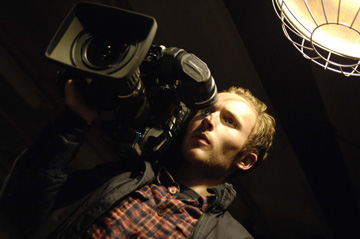Whenever I go to a party, particularly one with lithe lads and lasses who are a good five or seven years younger than me, I feel a great sense of delight when another bald man arrives. “Aha!” I cry. “One of my kind!” Any lingering nervousness lifts. And I often single out my bald compatriot with a cheery hello, sometimes offering a telling wink or a gentle, avuncular nudge. It is my hope to imbue any bald man with a sense that they could be as badass as Samuel L. Jackson or Patrick Stewart or Sean Connery if they really wanted to be.
I should point out that my thatchy crescent has not yet completely receded. It has remained, much to my shock, recalcitrant in some places and skin-abdicating in others. For example, there remains a small but stubborn patch two inches above the outer edge of my left eyebrow that does not wish to yield to the fleshy inevitability just over the hill. I have taken to shaving my hair off every few months just to see how much of the hair will grow back. And to keep things quite fun, I have also grown more beards in the past year than I have in all the years previously. (The beard growing/hair shaving gambit is also my way of adjusting to the pronounced shift in seasons, which I am truly unused to — this being my first year living outside of California.)
But the balding is slower than I imagine. A friend who hasn’t seen me in two or three years will often refrain from telling me how much hair I’ve lost. And while I’ve long accepted the fact that I’m balding and would not take offense, I’m honored by this politeness and hold my tongue.
But back to this business of the other bald man: sometimes, when the other bald man is younger than me and has balded more substantially than I have, there is something of a social impasse. Particularly when the other bald man is experiencing some crisis of confidence common to a young man in his mid-to-late twenties. And instead of returning my good-hearted cheer, the other bald man’s eyes dart upwards to the hairy isthmus at the top of my head and widen with a sense of fear and panic. And whatever words I have to say on the subject (“Don’t worry. I’m sure it will be gone in a few years.”) are nulled by the sense that I somehow got a better deal. When in fact, the degree of one’s hair loss has no real bearing.
A few evenings ago, I encountered another bald man of this type and began to conduct some social experiments. I would move to a corner of the room he was occupying and beads of sweat would appear on his forehead. He would then move away. I would shift again. He would move away again. I had never met this guy before. And he certainly didn’t know me. I was a bit boisterous, as I usually am at such occasions. But I was polite and did nothing out of the ordinary.
Since the other bald men wished to ignore me, it became necessary to take things to the next level. I began talking to several young ladies, determining which ones were single, and, for those who did not appear to have a date or a steady man, I started suggesting that they talk to this other bald men. I made oblique references to a great act of courage that I had heard about. I pointed to the other bald man’s wit, écalt, and other factors, and even managed to cajole a few of them to walk across the room and start talking with him. And I would watch the other bald man blow these opportunities in minutes.
I suppose I sympathized because I was that bald man once, before I snapped out of it. Regrettably, balding is one of those things that we’re expected to sneer down on. The same way shallow and myopic types concern themselves over those who are fatter, older, or some needless aesthetic qualifier that ends with -er, and feel the compulsive need to expend a good deal of time, money, and energy over this when it’s far simpler to accept others as much as one can.
Because of this, you’ll always find me saluting and encouraging the other bald man at a party. He may very well have his act together, but it never hurts to remind him that there’s a hell of a lot more going on than “Who loves ya, baby?”
 This is a pity, because Diary of the Dead is a gutsy and energetic film that believes in its audience more than Land of the Dead ever did. Romero made something of a mistake going to the big studios. He’s always been a more instinctive and playful filmmaker when working the indie turf. Land‘s blunt gas nozzle through the windshield has been replaced by more intriguing symbolism, such as a deaf Amish farmer now giddily grenading the dead and an overturned American flag hanging from a dormitory wall.
This is a pity, because Diary of the Dead is a gutsy and energetic film that believes in its audience more than Land of the Dead ever did. Romero made something of a mistake going to the big studios. He’s always been a more instinctive and playful filmmaker when working the indie turf. Land‘s blunt gas nozzle through the windshield has been replaced by more intriguing symbolism, such as a deaf Amish farmer now giddily grenading the dead and an overturned American flag hanging from a dormitory wall.  Told from the perspective of college filmmakers who see the (again unexplained) rising of the dead as an opportunity to record “a part of history,” Diary is a claustrophobic assault on media culture. “I just want to record it,” chants Jason Creed like a creed. He’s the director of the film-within-the-film, The Death of Death. And while his fellow students are initially uncomfortable, they become distressingly accustomed to having cameras in their faces. Some may decry the “amateur” acting, but when Romero has his actors mug for the camera, it’s symptomatic of a disease more pervasive than the zombies. At one point, just before entering an abandoned house, Creed tells his cadre to stop so that he can get a good wide angle shot. The voice of reason (so dissolute that he clings to a first edition of Dickens and seems, like Abigail’s Party‘s Laurence, more taken with the cover) is an alcoholic professor named Maxwell, named perhaps after the mathematician who proved that light was an electromagnetic wave and who thus made cinema and DV possible. Maxwell’s weapon of choice is not a gun, but a bow and arrow, which suggests that Romero’s affinity for chivalry — seen most prominently in his underrated film Knightriders — still holds.
Told from the perspective of college filmmakers who see the (again unexplained) rising of the dead as an opportunity to record “a part of history,” Diary is a claustrophobic assault on media culture. “I just want to record it,” chants Jason Creed like a creed. He’s the director of the film-within-the-film, The Death of Death. And while his fellow students are initially uncomfortable, they become distressingly accustomed to having cameras in their faces. Some may decry the “amateur” acting, but when Romero has his actors mug for the camera, it’s symptomatic of a disease more pervasive than the zombies. At one point, just before entering an abandoned house, Creed tells his cadre to stop so that he can get a good wide angle shot. The voice of reason (so dissolute that he clings to a first edition of Dickens and seems, like Abigail’s Party‘s Laurence, more taken with the cover) is an alcoholic professor named Maxwell, named perhaps after the mathematician who proved that light was an electromagnetic wave and who thus made cinema and DV possible. Maxwell’s weapon of choice is not a gun, but a bow and arrow, which suggests that Romero’s affinity for chivalry — seen most prominently in his underrated film Knightriders — still holds.  Adam Swica’s cinematography favors crisp and steely digital blues. The visuals remain cold and rampant even when a camera is shoved in the face of a young woman trying to remain calm after driving over a number of zombies. “How do you feel?” asks Creed, unable to discern the tangible trauma.
Adam Swica’s cinematography favors crisp and steely digital blues. The visuals remain cold and rampant even when a camera is shoved in the face of a young woman trying to remain calm after driving over a number of zombies. “How do you feel?” asks Creed, unable to discern the tangible trauma.